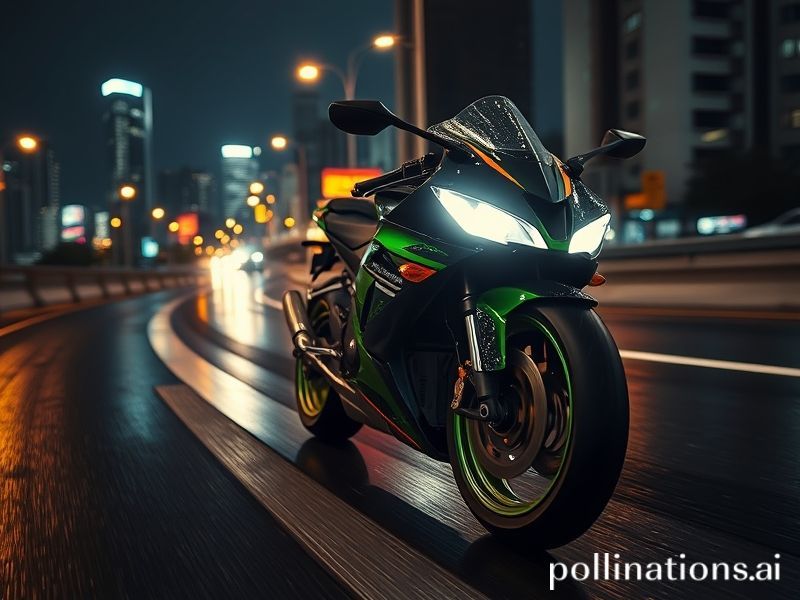Kawasaki: The Quiet Conglomerate Powering Your Motorcycle, Your Gas Tank, and Possibly the Next Energy War
Kawasaki: The Brand That Quietly Powers Your Midlife Crisis and the Global Order
By Dave’s International Affairs Desk (currently nursing an espresso in a Tokyo capsule hotel that smells faintly of regret and octopus ink)
To much of the planet, “Kawasaki” is either the satisfying thrum of a Ninja ZX-10R splitting lanes on the Autobahn, or the vaguely threatening green stamp on the side of an oil tanker that just delivered your Finnish petrol. Both impressions are correct, which is precisely why the name should trigger a low-grade existential shudder. Somewhere in the supply chain between your impulse-buy motorcycle and the liquefied natural gas that keeps European radiators humming, Kawasaki Heavy Industries is playing three-dimensional chess while the rest of us argue on Twitter.
The company started in 1878 as a shipyard in a country that had only recently learned to spell “industrial revolution” in English. Today it occupies the same geopolitical niche as a Swiss army knife: quietly indispensable, slightly menacing, and capable of stabbing you in seventeen different ways. It builds bullet trains for India, industrial robots for Bavarian car plants, submarines for the Japanese navy, and—because nothing screams “diversified portfolio” like existential dread—airships for people who still believe the Hindenburg was a one-off. Somewhere on the balance sheet, the same conglomerate that gives American dentists weekend adrenal highs on lime-green crotch-rockets is also perfecting cryogenic hydrogen tanks for the next energy war. Your midlife crisis is subsidizing deterrence in the East China Sea; try fitting that on a bumper sticker.
Globalization’s punchline is that the same factory floor in Kobe stamps out both the H2R superbike—0-60 faster than a hedge fund’s apology—and the cargo holds that shuttle Qatari LNG to Rotterdam. One product exists to let middle-aged men cosplay freedom at 186 mph; the other keeps Europe from freezing to death after it sanctioned the cheaper stuff. Somewhere in corporate HQ, a middle manager has to run a spreadsheet balancing piston tolerances against thermodynamic efficiency of liquefaction units, which is a polite way of saying the same engineers solve horsepower and megawatts like they’re interchangeable Lego bricks. They are, and that should terrify anyone who still believes in national silos.
The pandemic offered a masterclass in this interconnectivity. When the Suez Canal was blocked by one renegade container ship (not Kawasaki’s, but poetic enough), the delay rippled outward: Indian steel mills idled, German brake suppliers panicked, and suddenly your local dealership couldn’t source the lime-green fender for the Versys you definitely needed to outrun your divorce. Meanwhile, Kawasaki’s shipyard division accelerated orders for LNG carriers because Europe realized Gazprom breakups are messy. Same company, same fiscal year, two planetary mood swings mediated by quarterly earnings calls.
Environmentalists love to hate motorcycles, yet Kawasaki’s latest hydrogen-fueled bike prototype emits nothing but water vapor and the faint smugness of early adopters. It’s the same tech the firm is scaling for maritime engines, because the International Maritime Organization has decreed that cargo ships must stop treating the atmosphere like an open sewer. In other words, the weekend warrior carving canyons outside LA is beta-testing the decarbonization of global trade. If that sounds like an ethical sleight of hand, welcome to late-stage capitalism: virtue is just another product line.
Of course, every empire has its cracks. Kawasaki’s recent recall of 25,000 motorcycles over faulty brake pistons coincided with a separate recall of cargo-ship engines for potential crankshaft failures. The symmetry would be beautiful if it weren’t so literally fatal. Stock analysts called it “a reputational speed bump.” Translation: people might die, but the brand equity remains intact. Meanwhile, Tokyo bureaucrats mutter about defense export restrictions, because nothing jeopardizes a pacifist constitution like selling submarines to Australia while pretending they’re for “research.”
So the next time you hear the unmistakable growl of a Kawasaki four-cylinder downshifting past your café window, remember it’s not just a bike. It’s a floating LNG terminal, a robotic factory arm, a naval deterrent, and—if the hydrogen gamble pays off—the reason your grandkids might inherit a habitable planet. All of which is impressive, but let’s not get sentimental. The real miracle is that the same corporation can extract profit from your vanity and your survival instinct without ever letting you feel the blade go in. That, dear reader, is engineering.







